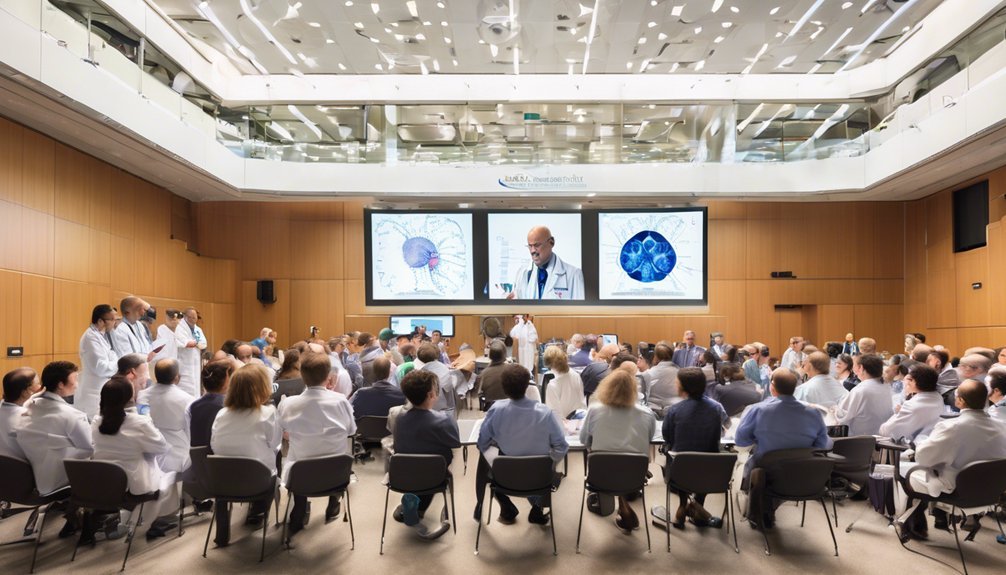Have you ever considered the profound impact that holistic approaches can have on your journey to beating cancer? As you navigate the complexities of treatment options and decisions, exploring a holistic approach could offer you a unique perspective on enhancing your well-being and resilience. From acupuncture and meditation to nutritional interventions and spiritual healing practices, each element plays a crucial role in supporting your mind, body, and spirit throughout this challenging time. Stay tuned to uncover how these diverse strategies can come together to empower you in your fight against cancer.
Key Takeaways
- Mind-body therapies like meditation and yoga reduce stress and promote healing.
- Nutritional support boosts the immune system and aids in cancer treatment.
- Emotional support services help cope with the emotional impact of cancer.
- Physical wellness programs improve overall well-being and reduce side effects.
- Integrative cancer care offers personalized holistic treatment plans for optimal outcomes.
Mind-Body Connection
Understanding the mind-body connection is crucial when it comes to holistic approaches to beating cancer. Positive thinking plays a significant role in your journey towards healing. Research suggests that maintaining a positive mindset can boost the immune system, reduce stress levels, and enhance overall well-being. By cultivating a positive outlook, you empower your body to fight the disease more effectively.
Emotional healing is another vital aspect of the mind-body connection. Cancer can be emotionally taxing, leading to feelings of fear, anxiety, and despair. Acknowledging and addressing these emotions is essential for your mental and physical health.
Engaging in activities like meditation, counseling, or support groups can help you process these emotions and promote inner healing.
Acupuncture Therapy
The mind-body connection is a powerful tool in your journey towards holistic cancer treatment. Acupuncture therapy, a key component of holistic approaches, offers numerous benefits and has shown effectiveness in supporting cancer patients. Here are some reasons why acupuncture can be beneficial for you:
- Pain Management: Acupuncture is known to help alleviate cancer-related pain, reducing the need for high doses of pain medications.
- Stress Reduction: By stimulating specific points on the body, acupuncture can help lower stress levels and promote relaxation during the challenging times of cancer treatment.
- Improved Sleep Quality: Many cancer patients struggle with sleep disturbances, and acupuncture has been shown to support better sleep patterns.
- Enhanced Immune Function: Acupuncture may boost the immune system, allowing your body to better fight off illnesses and support overall health.
- Emotional Well-being: Acupuncture sessions can contribute to emotional balance, providing a sense of calm and well-being amidst the emotional turmoil that cancer can bring.
Consider incorporating acupuncture therapy into your holistic cancer treatment plan to experience these benefits and support your overall well-being.
Meditation Practices

How can meditation practices enhance your holistic approach to cancer treatment? Incorporating mindfulness techniques, relaxation exercises, visualization methods, and breathwork practices into your daily routine can provide immense benefits during your cancer journey.
Mindfulness techniques help you stay present, reducing stress and anxiety levels often associated with cancer treatment. Relaxation exercises, such as progressive muscle relaxation or guided imagery, can promote a sense of calmness and overall well-being.
Visualization methods allow you to imagine healing processes within your body, fostering a positive outlook on your health. Breathwork practices, like deep breathing exercises, can help in managing pain, improving oxygen flow, and enhancing relaxation. These meditation practices not only support your mental and emotional well-being but also have physical benefits that complement conventional cancer treatments.
Nutritional Interventions
Navigating a cancer diagnosis involves considering various aspects of your health, including how nutrition plays a crucial role in your overall well-being. When it comes to nutritional interventions, there are several key strategies you can incorporate to support your health journey:
- Incorporate plant-based diets: Increasing your intake of fruits, vegetables, whole grains, and legumes can provide essential nutrients and antioxidants that support your immune system and overall health.
- Consider dietary supplements: Consult with your healthcare provider about incorporating supplements like vitamin D, omega-3 fatty acids, and probiotics to support your nutritional needs during cancer treatment.
- Stay hydrated: Drinking an adequate amount of water is crucial for maintaining hydration, aiding digestion, and flushing out toxins from your body.
- Limit processed foods: Reduce your consumption of processed and sugary foods, which can contribute to inflammation and weaken your immune system.
- Seek guidance from a nutritionist: Work with a professional to create a personalized nutrition plan that meets your specific dietary needs and supports your cancer treatment.
Exercise Regimens

Amidst your cancer journey, integrating exercise regimens can play a pivotal role in enhancing your overall well-being and resilience. Both resistance training and cardiovascular exercise are vital components of a holistic approach to combatting cancer.
Resistance training, such as lifting weights or using resistance bands, can help improve muscle strength and endurance, which may decline during treatment. This type of exercise also aids in maintaining bone density and overall physical function.
On the other hand, cardiovascular exercises like walking, swimming, or cycling can boost your heart health, increase your stamina, and elevate your mood.
Engaging in a balanced mix of resistance and cardiovascular exercises can't only enhance your physical capabilities but also contribute to reducing stress, anxiety, and depression commonly associated with a cancer diagnosis. Always consult with your healthcare team before starting any exercise regimen, and remember that even small amounts of physical activity can make a significant difference in your journey towards beating cancer.
Herbal Remedies
Exploring the realm of herbal remedies can offer a complementary approach to managing the symptoms and side effects that may accompany your cancer journey. Plant-based treatments and botanical supplements have been used for centuries as alternative medicines to support overall well-being. Here are five key points to consider when delving into the world of herbal remedies:
- Consult with a Professional: Before incorporating any herbal remedies into your routine, consult with your healthcare provider to ensure they don't interfere with your current treatment plan.
- Research Thoroughly: Take the time to research different herbs and supplements, understanding their potential benefits and risks.
- Quality Matters: When choosing herbal products, opt for reputable brands that ensure quality and purity.
- Start Slowly: Introduce one herb at a time in small doses to monitor how your body responds.
- Be Patient: Natural remedies may take time to show effects, so be patient and consistent in your approach.
Aromatherapy Techniques

Incorporating aromatherapy techniques into your cancer management plan can provide a holistic approach to enhancing your well-being. Essential oil blends and scent therapy have been shown to offer various benefits that can complement traditional cancer treatments. Aromatherapy uses plant extracts to promote physical and psychological well-being. Here is a simple guide to get you started on your aromatherapy journey:
| Essential Oil Blend | Benefits |
|---|---|
| Lavender & Peppermint | Soothes nausea and aids relaxation |
| Lemon & Rosemary | Boosts mental clarity and reduces fatigue |
| Eucalyptus & Tea Tree | Supports respiratory health and eases breathing |
Aromatherapy can help manage symptoms such as stress, anxiety, and pain, providing a sense of comfort during challenging times. When using essential oils, ensure they are pure and consult with a healthcare provider to ensure compatibility with your current treatment plan. Experiment with different scents to find what works best for you, creating a calming and rejuvenating atmosphere.
Energy Healing Modalities
Embracing energy healing modalities can offer a complementary approach to managing cancer treatment. These modalities focus on restoring the body's natural energy flow to promote healing. Two widely recognized energy healing techniques are Chakra balancing and Reiki healing. Here are some key points to consider:
- Chakra Balancing: This practice involves aligning the body's energy centers to promote physical, emotional, and spiritual well-being.
- Reiki Healing: By channeling energy through touch, Reiki practitioners aim to activate the natural healing processes of the body.
- Complementary Therapy: Energy healing can be used alongside traditional cancer treatments to enhance overall wellness.
- Mind-Body Connection: These modalities emphasize the interconnectedness of physical health and emotional balance.
- Personalized Approach: Energy healing is often tailored to individual needs, considering the unique energy patterns of each person.
Stress Management Strategies

Managing stress is a crucial aspect of holistic cancer care that can significantly impact your overall well-being and treatment outcomes. Incorporating stress management strategies such as breathing exercises and relaxation techniques can help you navigate the challenges of cancer treatment more effectively.
When you feel overwhelmed, taking a few moments to practice deep breathing exercises can help calm your mind and reduce anxiety. Focus on slowly inhaling and exhaling, allowing your body to relax and release tension.
Additionally, engaging in relaxation techniques like progressive muscle relaxation or guided imagery can promote a sense of peace and tranquility amidst the uncertainties that cancer brings.
Emotional Support Systems
To navigate the emotional challenges that come with a cancer diagnosis, establishing a robust support system is key. When facing such a difficult time, you need a network of individuals who can provide understanding, empathy, and encouragement. Consider the following emotional support systems:
- Peer Counseling: Engaging with others who've walked a similar path can offer unique insights and shared experiences.
- Support Groups: Joining a support group can provide a sense of community and belonging, allowing you to connect with others facing similar struggles.
- Family Therapy: Involving your loved ones in therapy sessions can help strengthen relationships and enhance communication during this challenging period.
- Healing Circles: Participating in healing circles can provide a safe space for emotional expression and spiritual connection.
- Professional Counseling: Seeking the guidance of a trained counselor or therapist can offer personalized support and coping strategies tailored to your needs.
Spiritual Healing Practices

In times of illness, turning to spiritual healing practices can provide a source of comfort and inner strength. Faith healing, a practice rooted in the belief in divine intervention, can offer solace and hope during challenging times. Many find peace in connecting with their faith traditions, seeking guidance, and finding a sense of purpose beyond their illness.
Energy clearing is another spiritual practice that focuses on balancing the body's energy fields to promote healing. This practice involves techniques such as Reiki, acupuncture, or meditation to clear blockages and restore harmony within the body. By aligning the body's energy, individuals may experience reduced stress, improved emotional well-being, and a renewed sense of vitality.
While spiritual healing practices may not offer a cure for cancer, they can complement conventional treatments by enhancing overall well-being. Embracing these practices can cultivate a sense of inner peace, resilience, and hope as you navigate your cancer journey. Consider incorporating spiritual healing practices into your holistic approach towards beating cancer for a more comprehensive healing experience.
Integrative Cancer Care
Opting for an integrative approach to cancer care can significantly enhance your overall treatment experience. Integrative cancer care combines conventional medical treatments with alternative therapies and complementary treatments to address not just the physical aspect of cancer but also the emotional, mental, and spiritual well-being of patients. Here are five key components of integrative cancer care to consider:
- Personalized Treatment Plans: Tailored to your specific needs and preferences.
- Mind-Body Therapies: Such as meditation, yoga, and acupuncture to reduce stress and improve quality of life.
- Nutritional Support: Incorporating a healthy diet to boost your immune system and overall health.
- Emotional Support Services: Including counseling, support groups, and art therapy to help you cope with the emotional impact of cancer.
- Physical Wellness Programs: Exercise routines and massage therapy to promote physical well-being and reduce treatment side effects.
Integrative cancer care can empower you to take an active role in your healing journey and promote holistic well-being throughout your cancer treatment.
Frequently Asked Questions
Can Holistic Approaches Cure Cancer Completely?
Holistic approaches, including a healing mindset and integrative therapies, can play a significant role in cancer treatment. While these methods can support overall well-being and complement traditional medical treatments, it's essential to approach them as part of a comprehensive care plan.
While holistic approaches can positively impact health and quality of life, it's crucial to consult with healthcare professionals to determine the best course of action for your individual situation.
Are Holistic Treatments Safe to Use Alongside Conventional Cancer Therapies?
You might wonder if holistic treatments are safe to use alongside conventional cancer therapies. Safety concerns and efficacy questions often arise when considering this.
It's important to consult with your healthcare team before adding any holistic treatments to your regimen. They can help you understand potential risks and benefits, ensuring you make informed decisions about your care.
How Long Does It Take to See Results With Holistic Treatments?
When exploring holistic treatments, patient expectations are crucial. Timeframes for seeing results can vary, but typically, improvements may be noticed within a few weeks to a few months. Consistency and patience are key.
Remember, holistic approaches focus on the body's natural healing abilities, which often require time to manifest. It's essential to communicate openly with your healthcare team and monitor progress together.
Stay positive and trust the process.
Can Holistic Approaches Prevent Cancer Recurrence?
Yes, lifestyle changes and the mind-body connection play crucial roles in preventing cancer recurrence holistically.
By adopting a healthy diet, engaging in regular exercise, managing stress effectively, and fostering positive mental health, you can create an environment in your body that's less conducive to cancer growth.
These holistic approaches not only support physical well-being but also strengthen your immune system, reducing the likelihood of cancer returning.
Are There Any Potential Side Effects of Holistic Cancer Treatments?
When considering holistic cancer treatments, it's important to be aware of potential risks. Some treatments may have side effects like digestive issues or allergic reactions. Safety concerns arise from the lack of regulation in some holistic practices.
Always consult with healthcare professionals to ensure the treatment is safe and complements conventional cancer care. Remember to prioritize your well-being and make informed decisions about your holistic treatment plan.
Conclusion
You've learned about the power of holistic approaches in beating cancer, like acupuncture and meditation. Just like a symphony conductor harmonizing different instruments for a beautiful melody, integrating mind-body practices, nutrition, exercise, and emotional support can create a holistic approach to cancer care. By embracing these elements, you can foster resilience and hope on your cancer journey, empowering yourself to face challenges with strength and positivity.





